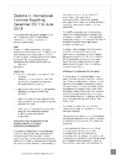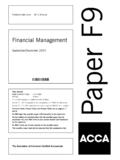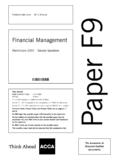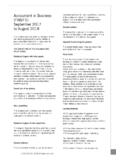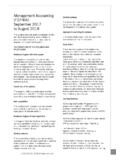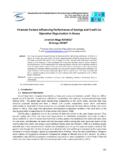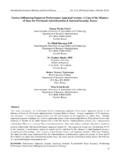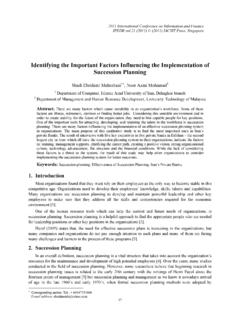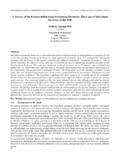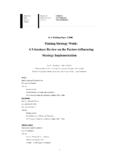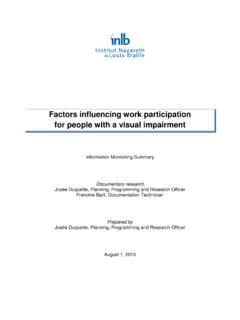Transcription of Essentials Performance Objectives - ACCA Global
1 1 Essentials Performance Objectives PO1 Professionalism and ethics Description The fundamental principles of ethical behaviour mean you should always act in the wider public interest. You need to take into account all relevant information and use professional judgement, your personal values and scepticism to evaluate data and make decisions. You should identify right from wrong and escalate anything of concern. You also need to make sure that your skills, knowledge and behaviour are up-to-date and allow you to be effective in your role. Elements a. Act diligently and honestly, following codes of conduct, taking into account and keeping up-to-date with legislation.
2 B. Act with integrity, objectivity professional competence and due care and confidentiality. You should raise concerns about non-compliance. c. Develop a commitment to your personal and professional knowledge and development. You should become a life-long learner and continuous improver, seeking feedback and reflect on your contribution and skills. d. Identify, extract, process and evaluate information to make reliable, well-reasoned conclusions. e. Check, critically analyse and assess financial and other data with professional scepticism. You should question opinion and facts through corroboration and robust testing.
3 Example activities Applying legislation appropriately to client needs Continually reviewing legislation and regulation that affects your working environment Briefing a team on a new standard and how to apply it Keeping sensitive information confidential and disclosing only to those who need it or when disclosure is legally required Recognising unethical behaviour and telling your line manager about what you have seen Avoiding situations where there may be any threat to your professional independence Deciding what information is important and reliable, using it to support your decision making Completing all the code of conduct and/or professional ethics training provided by your organisation Checking transactions and supporting documents to verify the accuracy of accounting records PO2 Stakeholder relationship management Description You manage stakeholder expectations and needs, developing and maintaining productive business relationships.
4 You listen to and engage stakeholders effectively and communicate the right information to them when they need it. Elements a. Display sensitivity, empathy and cultural awareness in all your communications. This allows you to establish trust and credibility with a range of stakeholders and gain their confidence. 2 b. Use a range of mediums and make appropriate use of IT to communicate clearly, concisely and persuasively in formal and informal situations. c. Gain commitment from stakeholders by consulting and influencing them to solve problems, meet Objectives and maximise mutually beneficial opportunities.
5 D. Develop and build effective and ethical professional relationships and networks. e. Deal calmly and efficiently with conflicting priorities, deadlines or opinions both internally and externally by listening and negotiating. Example activities Communicating in a way that suits the audience or audiences, using the right tone, style and medium. This could include communicating with clients from different cultures Developing relationships in meetings that lead to positive outcomes Discussing work problems with colleagues or clients to improve and maintain relationships Planning for and engaging positively with the appraisal process Using media and technology to contribute to business-related discussions for example, contributing to intranet community conversations.
6 Hosting teleconferences or making online presentations Presenting internally or externally Participating effectively in interviews Drafting reports effectively Dealing well with conflicting deadlines or requirements Acting responsibly and with maturity when there are disagreements Addressing service level complaints Engaging with internal customers throughout the organisation Discussing expectations of your work with your supervisor Working within your supervisor s requirements and giving them regular progress updates Networking at conferences, internally or by joining business-related groups PO3 Strategy and innovation Description You contribute to the wider business strategy of your organisation through your personal and team Objectives .
7 You identify innovative ways to improve organisational Performance which may include making or recommending business process changes and improvements. Elements a. Research and be familiar with your employer s business, the sector it operates within and the wider business environment. b. Listen to and learn from colleagues and experts. Anticipate challenges, show openness and contribute to new ideas and opportunities. c. Plan, identify and monitor your personal targets and standards of delivery so that they meet the wider departmental and strategic Objectives of your organisation.
8 D. Think systematically, critically and innovatively when you re solving business problems. 3 e. Develop financial acumen and sound business judgement. This will allow you to anticipate potential business problems, recognise weaknesses and propose solutions. Example activities Using market data to research competitor activities Attending courses or conferences that will help you with your work Highlighting business problems or system issues Planning or managing a project Proposing innovative and practical ideas Discussing general business matters with your colleagues Thinking creatively and speaking openly about business issues and how to solve them Using online resources to develop commercial awareness.
9 This could include using social and business media to develop your business networks Highlighting issues at work which cause ineffectiveness or inefficiencies and recommending solutions Improving organisational systems/tools to drive innovation or process improvement Obtaining information from other departments to evaluate Performance or suggest business improvements PO4 Governance risk and control Description You contribute to effective governance in your area. You evaluate, monitor and implement risk management procedures, complying with the spirit and the letter of policies, laws and regulations.
10 Elements a. Provide and present information at the appropriate time to comply with organisational requirements and external regulation. b. Operate according to the governance standards, policies and controls of your organisation. You also review your work and your colleagues work to make sure it complies. c. Evaluate and identify areas of risk assessing the probability of fraud, error and other hazards in your area of responsibility, and the impact they would have. d. Assess the risk of failures in the internal controls and procedures in your area of responsibility.
